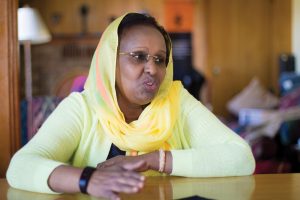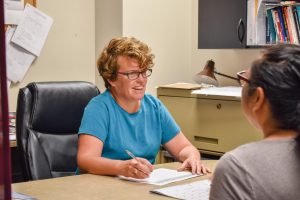
THE EMPHASIS at CJP is markedly different from what graduates encounter in PhD programs.
Those programs, after all, are known for work done in isolation, fierce competition and putting theory first – whereas CJP teaches peacebuilding as “a team activity,” said Professor Jayne Docherty. CJP approaches theory not as more import – ant than practice, but as a tool to inform and enrich creative and responsive practice. That means, Docherty said, that CJP students become “theorizers, not theorists” who know that “no one person gets this work done.”
Even so, nearly 10 percent of CJP graduates have gone on to doctoral studies – for which Docherty has a theory: “When you’re a practitioner and you attend a theoretically grounded, practice-oriented program like ours, you go back to the field and identify questions that you have to answer, problems that you just feel compelled to figure out.”
More than 60 CJP graduates have earned or are pursuing PhDs in law, literature, theology, trauma studies, social work, political science, peace studies, security and intelligence, leadership and more, from some 40 institutions in Australia, Canada, India, Ireland, South Africa and beyond.
Among them are Jodi Dueck-Read MA ‘03 and Khadija O. Ali MA ‘01 .
‘I LONGED FOR CJP’

Jodi Dueck-Read earned a PhD in order to teach and research. Her doctorate, completed in 2016, is in peace and conflict studies from the Mauro Centre for Peace and Justice, St. Paul’s College, University of Manitoba.
In years prior to her doctoral studies, Dueck-Read not only attended CJP but also worked with Mennonite Central Committee in Chile and Bolivia, where she taught conflict transformation at the Bolivian Evangelical University. In the U.S., she was program coordinator for the Zuni Avenue Peace Center and worked in migration and peacebuilding.
Writing a dissertation – hers was titled “Transnational Activism: Peacebuilding and Intersectional Identities in the Border Justice Movement” – can be “a long and lonely road,” she said. PhD programs offer limited opportunities to practice, and the emphasis on publishing and competition is a “dominant paradigm even in peace programs.”
While a doctoral student, “I longed for CJP,” she said, where “professors were encouraging and available.” Though her PhD program’s emphasis on writing and research did improve her skills, “CJP’s practical and lifelong connections are what peacebuilding is about.”
She now teaches conflict resolution studies at Menno Simons College in Winnipeg and is a senior research assistant for Canadian Financial Diaries.
HIGHER EDUCATION, EXPANDING FIELD
Before attending CJP, Khadija O. Ali was a civil society and women’s rights activist, community worker, and participant in both national and international conferences addressing humanitarian needs, conflict resolution and reconciliation. She also founded the Somali NGO SAACID, with the mission to “help women, children and the poor achieve their full human potential.”
Her own potential prompted her to pursue more education, and in 2001 she earned a master’s degree in conflict transformation from CJP. After graduating, Ali became a parliamentarian and minister of state in the transitional national government in Somalia. As she began “working fully in peacebuilding and mediation efforts,” however, she realized that “the Somali conflict was no longer local,” but regional and international.
A PhD was “the logical next step,” she said. She finished her doctoral studies at George Mason University in 2014, writing a dissertation titled “The Role of Hegemonies within African Regional Organizations’ Interventions: A Comparative Study of Nigeria in ECOWAS’ Intervention in Liberia and Ethiopia in IGAD’s Intervention in Somalia.”
“Before my PhD, I worked as a practitioner in community mobilization and mediation, and most of my focus was on grassroots activities,” she said. Now, she serves as an electoral commissioner for Somalia’s National Independent Electoral Commission in Mogadishu.
“My focus shifted to policy issues and looking at the bigger picture,” she said. “Conflict requires macro-level analysis and interventions with policies that are appropriate at all levels.”